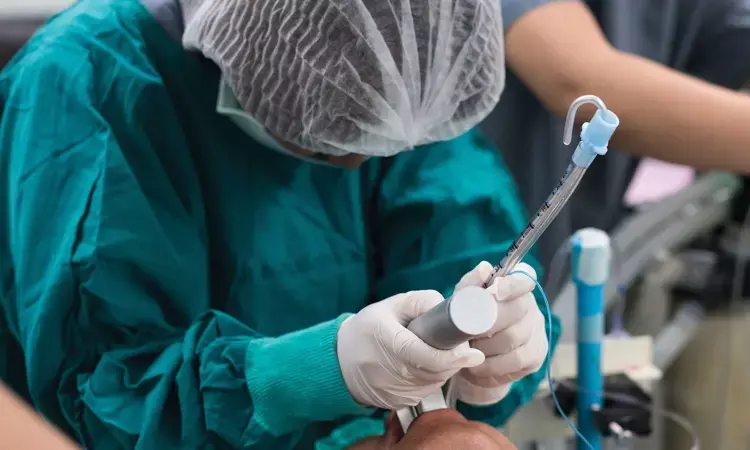- Home
- Medical news & Guidelines
- Anesthesiology
- Cardiology and CTVS
- Critical Care
- Dentistry
- Dermatology
- Diabetes and Endocrinology
- ENT
- Gastroenterology
- Medicine
- Nephrology
- Neurology
- Obstretics-Gynaecology
- Oncology
- Ophthalmology
- Orthopaedics
- Pediatrics-Neonatology
- Psychiatry
- Pulmonology
- Radiology
- Surgery
- Urology
- Laboratory Medicine
- Diet
- Nursing
- Paramedical
- Physiotherapy
- Health news
- Fact Check
- Bone Health Fact Check
- Brain Health Fact Check
- Cancer Related Fact Check
- Child Care Fact Check
- Dental and oral health fact check
- Diabetes and metabolic health fact check
- Diet and Nutrition Fact Check
- Eye and ENT Care Fact Check
- Fitness fact check
- Gut health fact check
- Heart health fact check
- Kidney health fact check
- Medical education fact check
- Men's health fact check
- Respiratory fact check
- Skin and hair care fact check
- Vaccine and Immunization fact check
- Women's health fact check
- AYUSH
- State News
- Andaman and Nicobar Islands
- Andhra Pradesh
- Arunachal Pradesh
- Assam
- Bihar
- Chandigarh
- Chattisgarh
- Dadra and Nagar Haveli
- Daman and Diu
- Delhi
- Goa
- Gujarat
- Haryana
- Himachal Pradesh
- Jammu & Kashmir
- Jharkhand
- Karnataka
- Kerala
- Ladakh
- Lakshadweep
- Madhya Pradesh
- Maharashtra
- Manipur
- Meghalaya
- Mizoram
- Nagaland
- Odisha
- Puducherry
- Punjab
- Rajasthan
- Sikkim
- Tamil Nadu
- Telangana
- Tripura
- Uttar Pradesh
- Uttrakhand
- West Bengal
- Medical Education
- Industry
CPAP Improves Glycemic Control in Patients with Sleep Apnea and diabetes

CPAP therapy has a notable impact on enhancing HbA1c levels, thereby contributing to improved long-term management of glycemic control in individuals living with type 2 diabetes and obstructive sleep apnea (OSA) finds a study published in European Respiratory Society.
The comprehensive review, which scoured databases including MEDLINE, Embase, Cochrane, and Scopus, examined the effect of CPAP therapy on glycemic control in patients grappling with both OSA and type 2 diabetes. This meta-analysis, involving a random-effect model, assessed outcomes reported in at least two RCTs. Of the 3031 records initially screened, 11 RCTs comprising a total of 964 patients met the criteria for inclusion in the analysis.
The findings of the systematic review provided compelling evidence in favor of CPAP therapy as a means to improve glycemic control in individuals facing the dual challenge of type 2 diabetes and OSA. Notably, CPAP treatment led to a statistically significant reduction in hemoglobin A1c (HbA1c), a key marker of long-term blood sugar control. The mean difference in HbA1c levels between the CPAP-treated group and the inactive control groups was -0.24%, with a 95% confidence interval ranging from -0.43% to -0.06%. This effect was deemed statistically significant with a p-value of 0.001.
Moreover, meta-regression analysis highlighted a significant association between the reduction in HbA1c and the number of hours patients adhered to their nightly CPAP therapy. This suggests that the extent of improvement in glycemic control is directly correlated with the patient's commitment to consistent CPAP usage.
The implications of these findings are substantial. Not only does this systematic review support the idea that CPAP therapy can positively impact the long-term blood sugar control of individuals suffering from OSA and type 2 diabetes, but it also underscores the importance of patient adherence to CPAP treatment protocols.
This systematic review brings promising news for individuals contending with both OSA and type 2 diabetes. CPAP therapy has emerged as a valuable tool in the quest for better blood sugar control, with the level of improvement directly tied to patient compliance. As healthcare providers work to manage these chronic conditions, optimal adherence to CPAP should be a primary goal in the treatment plan.
Source:
Herth, J., Sievi, N. A., Schmidt, F., & Kohler, M. (2023). Effects of continuous positive airway pressure therapy on glucose metabolism in patients with obstructive sleep apnoea and type 2 diabetes: a systematic review and meta-analysis. In European Respiratory Review (Vol. 32, Issue 169, p. 230083). European Respiratory Society (ERS). https://doi.org/10.1183/16000617.0083-2023
Neuroscience Masters graduate
Jacinthlyn Sylvia, a Neuroscience Master's graduate from Chennai has worked extensively in deciphering the neurobiology of cognition and motor control in aging. She also has spread-out exposure to Neurosurgery from her Bachelor’s. She is currently involved in active Neuro-Oncology research. She is an upcoming neuroscientist with a fiery passion for writing. Her news cover at Medical Dialogues feature recent discoveries and updates from the healthcare and biomedical research fields. She can be reached at editorial@medicaldialogues.in
Dr Kamal Kant Kohli-MBBS, DTCD- a chest specialist with more than 30 years of practice and a flair for writing clinical articles, Dr Kamal Kant Kohli joined Medical Dialogues as a Chief Editor of Medical News. Besides writing articles, as an editor, he proofreads and verifies all the medical content published on Medical Dialogues including those coming from journals, studies,medical conferences,guidelines etc. Email: drkohli@medicaldialogues.in. Contact no. 011-43720751


